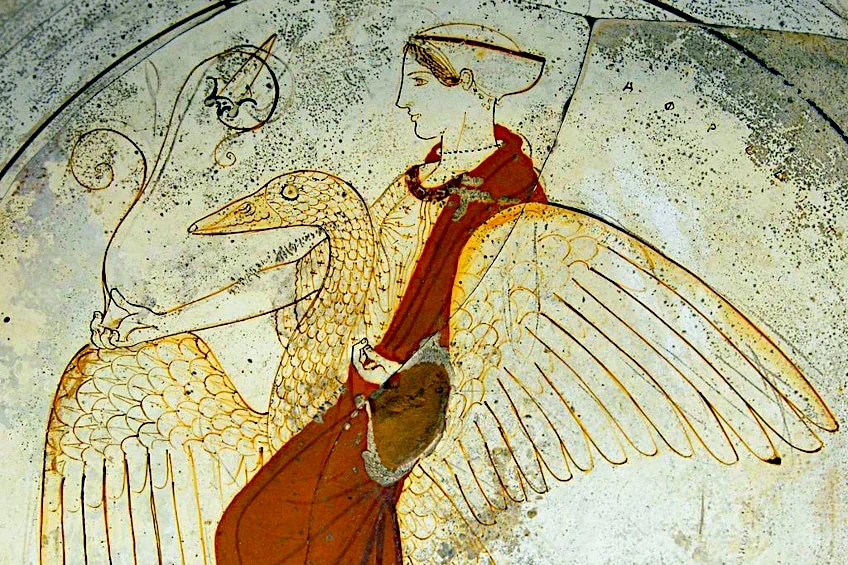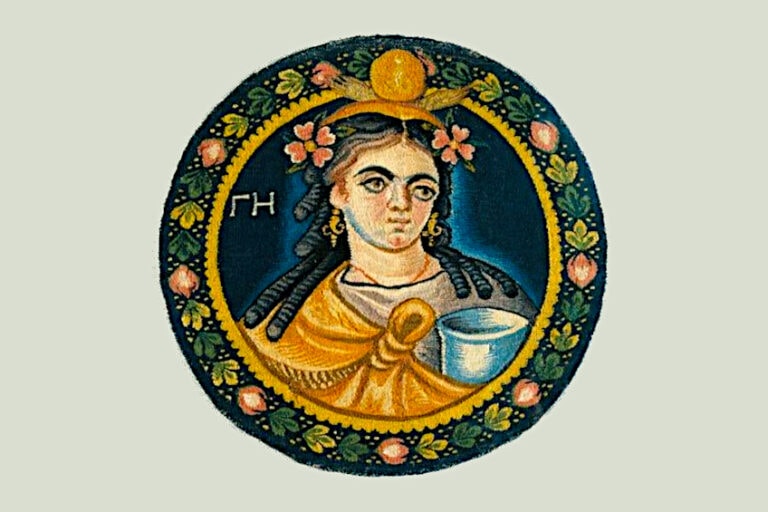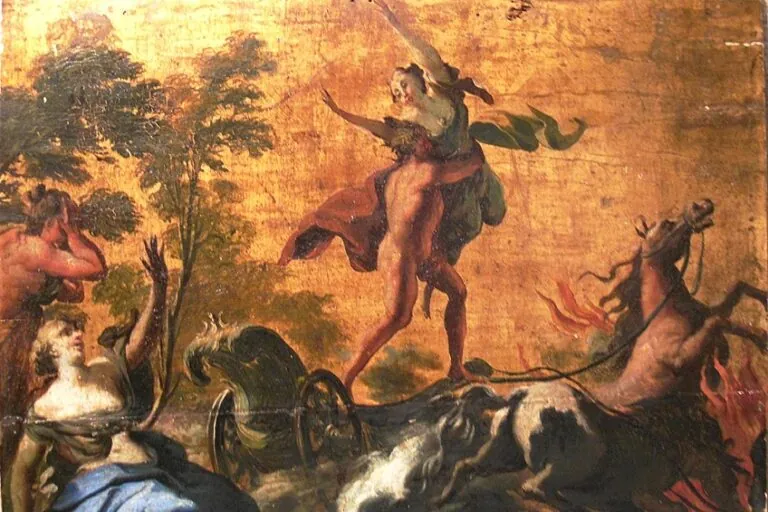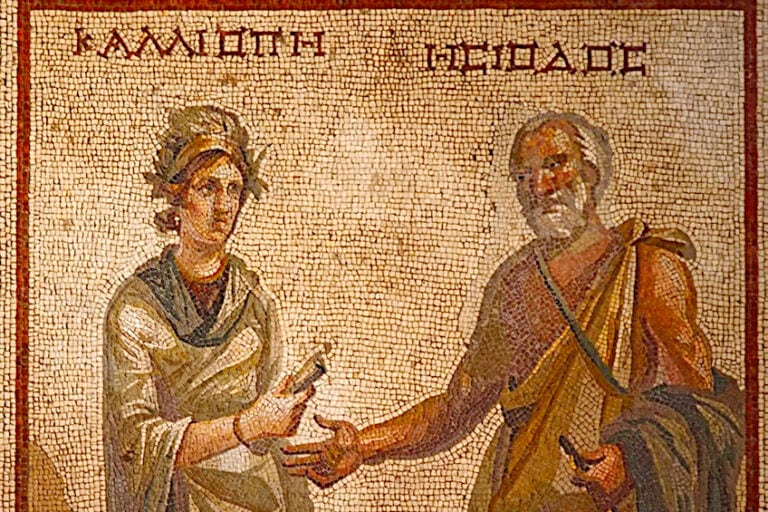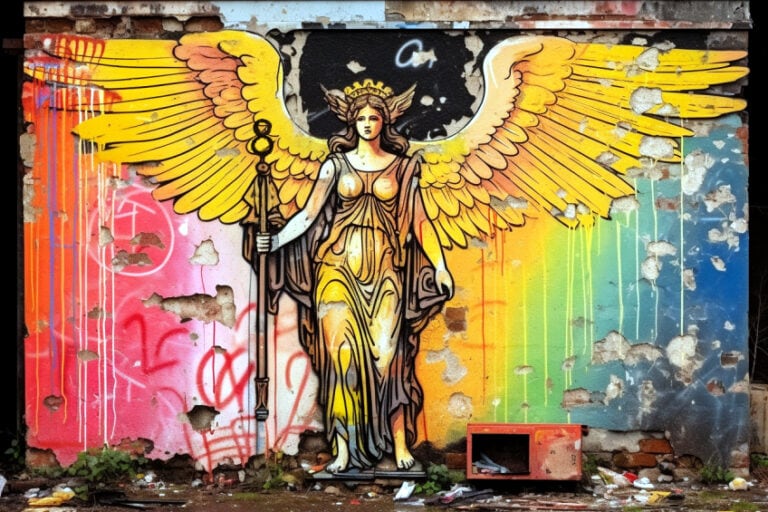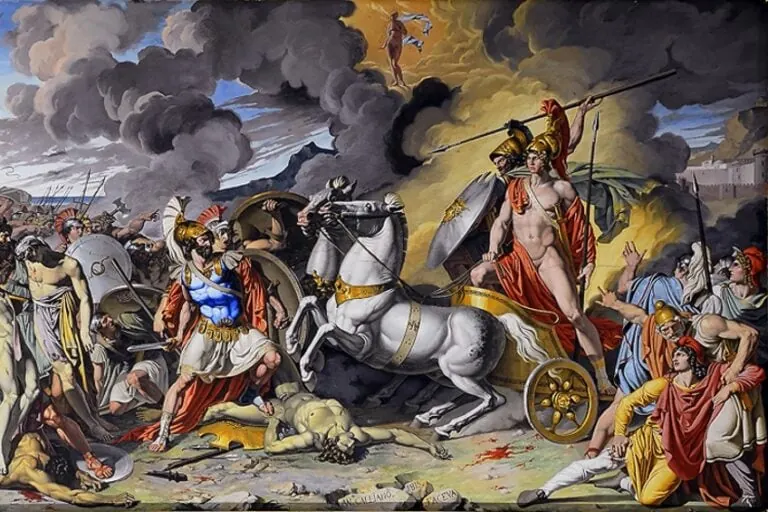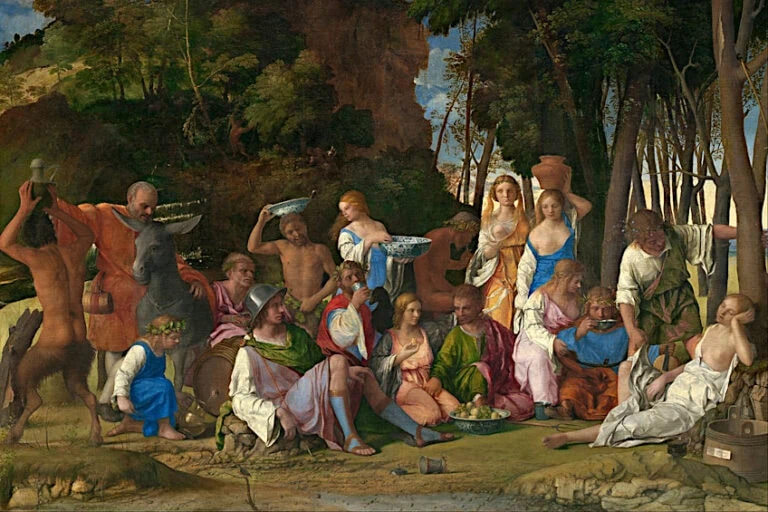Greek Goddess Aphrodite – Deity of Beauty, Pleasure, and Love
We have all heard of the Greek goddess Aphrodite, but what is Aphrodite the goddess of and what does Aphrodite want to control? As the famed goddess of love, Aphrodite wanted dominion over desire, attraction, and the ability to make people fall in love. In today’s exploration of this mythological goddess, we will be looking at all of the interesting facts about Aphrodite, examining the various Aphrodite symbols, and addressing your questions on the topic, such as “how was Aphrodite born?”. Join us in discovering the stories and significance of the famed Greek goddess Aphrodite!
Contents
The Story of the Greek Goddess Aphrodite
| Deity Name | Aphrodite |
| Gender | Female |
| Symbols | Doves, roses, seashells, and swans |
| Personality | Witty, vain, cunning, intelligent, and passionate |
| Deeds | Sided with Trojans in the Trojan War, caused the death of Hippolytos, and brought to life the statue of Pygmalion |
| Domain | Beauty and love |
| Parents | Zeus and Dione |
| Children | Phobos, Eros, Deimos, Pothos, Harmonia, Anteros, Hermaphroditus, Himeros, Rhodos, The Graces, Eryx, Peitho, Priapus, and Aeneas |
In the pantheon of Greek deities, there are 12 major gods and goddesses known collectively as the Olympians. One of these deities is the Goddess of love, called Aphrodite. The Greek Goddess Aphrodite is usually depicted as being very beautiful in art and literature and is typically portrayed as naked. Let’s find out more about the mythology of Aphrodite’s origins and role.
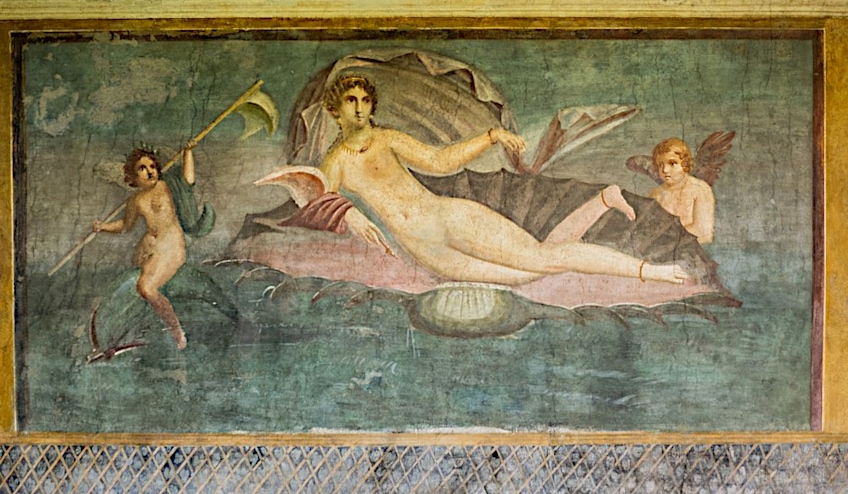 Fresco depicting Aphrodite/Venus rising from the sea from the Casa della Venere in Pompeii (before 79 CE); Sarahhoa, CC BY-SA 2.0, via Wikimedia Commons
Fresco depicting Aphrodite/Venus rising from the sea from the Casa della Venere in Pompeii (before 79 CE); Sarahhoa, CC BY-SA 2.0, via Wikimedia Commons
How Was Aphrodite Born?
There are two versions of Aphrodite’s parentage and birth. In one, she is the result of the battle between the sky Ouranos and his son Kronos. Ouranos had the habit of forcing the children that Earth or Gaia bore him back into her so that none could challenge him for supremacy. Gaia could no longer bear this and begged her sons to stop their father. The youngest son Kronos cut off his father’s testicles with a sickle and threw them into the ocean, causing the water to start foaming.
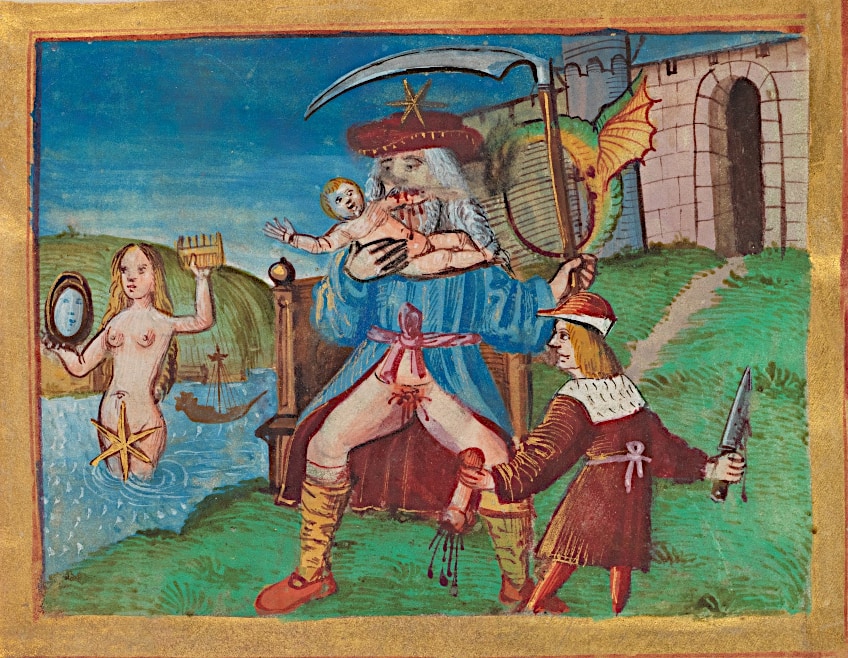 Medieval depiction of the birth of Aphrodite from the severed genitals of Ouranos (c. 1501); AnonymousUnknown author, Public domain, via Wikimedia Commons
Medieval depiction of the birth of Aphrodite from the severed genitals of Ouranos (c. 1501); AnonymousUnknown author, Public domain, via Wikimedia Commons
The goddess Aphrodite emerged from the white foam off the coast of Cyprus, near Paphos which was therefore sacred to her. In other versions, Aphrodite is the daughter of Zeus and Dione.
Eros and Himeros followed her from her birth to the assembly of the gods. Aphrodite’s cult in Greece originated from or was at least inspired by, the Phoenician cult of Astarte, which had been influenced by the Mesopotamian goddess, Ishtar. The people of inhabitants of Assyria were the first to develop an Aphrodite religion, followed by the Cyprus-based Paphians and later the Ascalon-based Phoenicians. The inhabitants of Cythera were taught to revere her by the Phoenicians.
Who Were the Goddess of Love’s Parents and Siblings?
While Aphrodite is said to be the offspring of Ouranos (Uranus) and Gaia (Earth), in many other accounts of her genealogy, she is the daughter of Zeus and Dione. Zeus was the pantheon’s main deity in ancient Greek mythology, a god of the weather and sky who was the equivalent of Jupiter in Roman mythology. His name was apparently derived from the ancient Hindu Rigvedic sky god Dyaus.
Zeus was characterized as the god of thunder, rain, lightning, and winds, and his customary weapon was the thunderbolt. He was commonly referred to as the father of both gods and humanity.
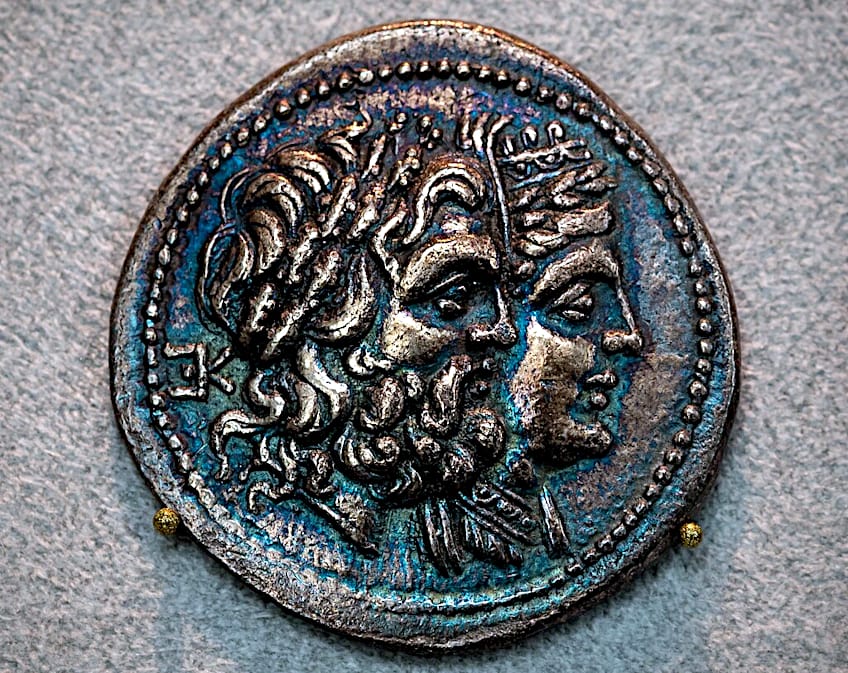 Silver coin from the Epirote League showing Zeus and Dione in Profile (c. 234-167 BCE); ArchaiOptix, CC BY-SA 4.0, via Wikimedia Commons
Silver coin from the Epirote League showing Zeus and Dione in Profile (c. 234-167 BCE); ArchaiOptix, CC BY-SA 4.0, via Wikimedia Commons
Kronos, king of the Titans, devoured his offspring as soon as they were born, according to a Cretan tale subsequently adapted by the Greeks, after hearing that one of his offspring was destined to dethrone and replace him. But his wife, Rhea, protected the baby Zeus by swapping a stone wrapped in swaddling blankets for Kronos to ingest and concealing Zeus in a Cretan cave.
Dione was a Greek Titan goddess, most likely the daughter of Tethys and Oceanus, and was therefore considered an Oceanid. Dione was the first wife of Zeus, with whom she produced Aphrodite. She was also an oracle who was revered along with Zeus at the first Oracle in Dodona.
In Homer’s Iliad when Aphrodite was slightly injured after protecting her son Aeneas from Diomedes, she ran crying to Dione to heal her. The prophetesses and priestesses at her shrine in Dodona were known as Peleiades (doves), after Aphrodite’s sacred bird. Aphrodite had many siblings, as well as many stepbrothers and sisters. These include Athena, Ares, Artemis Dionysus, Apollo, Hebe, Heracles, Hermes, Hephaestus, Helen of Troy, Perseus, Minos, and the Muses.
The Role and Significance of the Greek Goddess Aphrodite
The Goddess of Love has played varying roles throughout Greek history. Therefore, her significance has likewise differed from one era to the next. Let’s find out more about Aphrodite’s changing role and significance from the Classical to Hellenistic and Roman eras.
Aphrodite in the Classical Era
Aphrodisia, the Greek Goddess’s most significant festival, was held across Greece during the Classical period, but especially in Corinth and Athens. The Aphrodisia festival took place on the fourth day of Hekatombaion in Athens to commemorate Aphrodite’s role in the unity of Attica. During this event, Aphrodite’s priests would cleanse the Aphrodite Pandemos temple on the Acropolis’ southwestern slope with the sacrificial blood of a slaughtered dove.
The Greek goddess Aphrodite received additional recognition as part of the Arrhephoria celebration in Athens. Aphrodite was honored on the fourth day of each month. Aphrodite was worshiped under the name Areia as “warlike” in Sparta where her instigation of the Trojan War was well remembered.
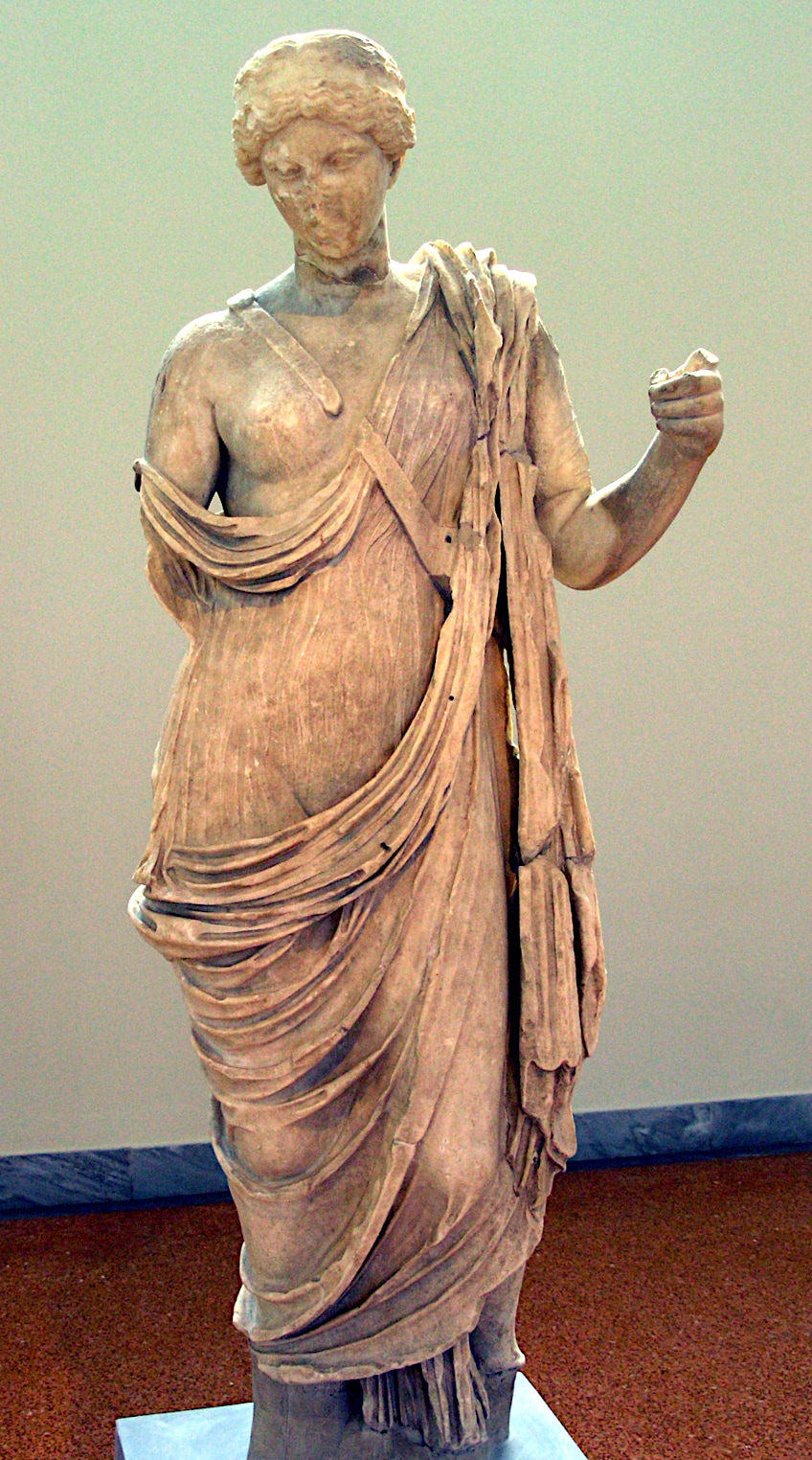 Aphrodite Areia. Roman copy of an original sculpture from the Polykleitos school (c. 400 BCE); National Archaeological Museum of Athens, CC BY-SA 2.5, via Wikimedia Commons
Aphrodite Areia. Roman copy of an original sculpture from the Polykleitos school (c. 400 BCE); National Archaeological Museum of Athens, CC BY-SA 2.5, via Wikimedia Commons
Aphrodite was associated with Ares, with whom the goddess of love had adulterous affairs. Aphrodite was depicted with arms in a number of exceptionally ancient cult statues in Cythera and Sparta, while she appeared to be bound in chains in others. Aphrodite was also the patron deity of all types of prostitutes, from street prostitutes who were often slaves owned by affluent pimps, known as pornai, to luxury, well-educated paid companions who were generally self-employed and occasionally provided their patrons with intimacy, known as hetairai.
Hellenistic and Roman Eras
The Greeks associated Aphrodite with the Egyptian goddesses Isis and Hathor throughout the Hellenistic era. The inhabitants of Alexandria worshiped Aphrodite and established various temples both in and around the city. Small statues of Aphrodite for private devotion became popular in Egypt beginning in the early Ptolemaic period and lasting until Egypt became a Roman colony. The ancient Romans associated Aphrodite with Venus, their goddess of flora, agricultural fertility, and spring.
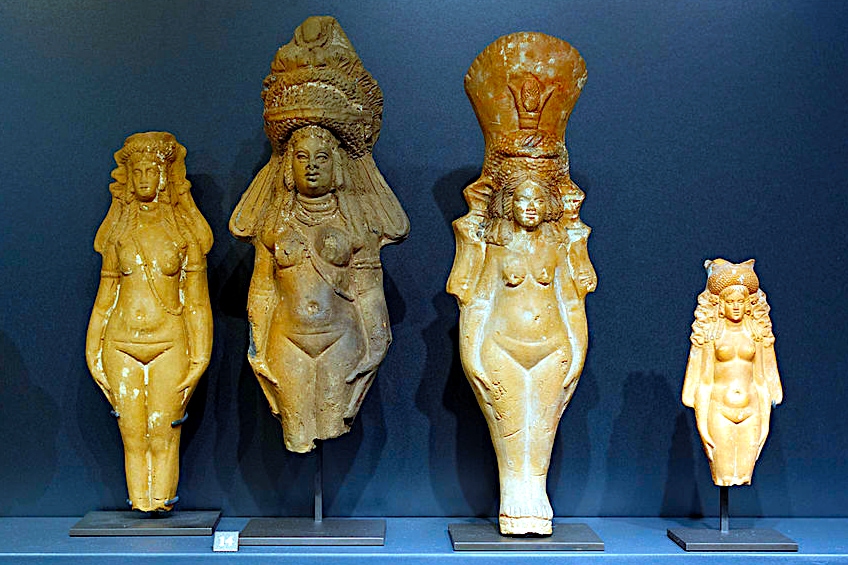 Terracotta figurines depicting Isis-Aphrodite (1st Century -4th Century CE); Coyau / Wikimedia Commons
Terracotta figurines depicting Isis-Aphrodite (1st Century -4th Century CE); Coyau / Wikimedia Commons
At some point, the Romans appropriated Aphrodite’s iconography and mythology. Virgil’s epic poem the Aeneid played a huge role in this transition. In Homer’s Iliad, on which Virgil’s poem was based, Aeneas is the son of Aphrodite. In the Aeneid he flees the ruins of Troy with his father and son to eventually settle in the region where Rome would later be founded. Since Virgil uses the Latin names for the gods in his poems, the Greek Aphrodite merges with the Roman Venus to become the divine “mother” of Rome.
During the Roman period, many Greek communities’ Aphrodite cults started to focus on her association with her son Aeneas. They also started incorporating the Roman characteristics of Venus into her cult, depicting Aphrodite as more maternal, martial, and preoccupied with bureaucratic administration. Many political officials claimed she offered divine protection. Aphrodite/Venus also appeared frequently in Greek literature, typically depicting her in a manner more typical of a Roman Matron.
Personality and Attributes of Aphrodite
Aphrodite is often portrayed as sensual, vain, misleading, and reckless. She was notorious for taking pleasure in provoking romantic entanglements, regardless of the repercussions. Aphrodite’s personality may differ based on the context in which she is depicted.
Personality
In Greek mythology, Aphrodite’s personality is described both favorably and negatively. She had the power to arouse excitement and passion as the goddess of love. When Paris chose Aphrodite as the most attractive deity, she became an ardent defender of the Trojans. Other writers interpret her intervention in Helen of Troy’s marriage as evidence of her wanton, sinful effect, and her backing of the Trojans as a reward for their allegiance to her beauty.
The Greek goddess Aphrodite was known for her sexuality and had several affairs with both divine beings and mortals. In an ironic twist, her husband was the rather unattractive and disabled fire god Hephaestus, while one of her favorite lovers was the very handsome Ares, god of war and brutality.
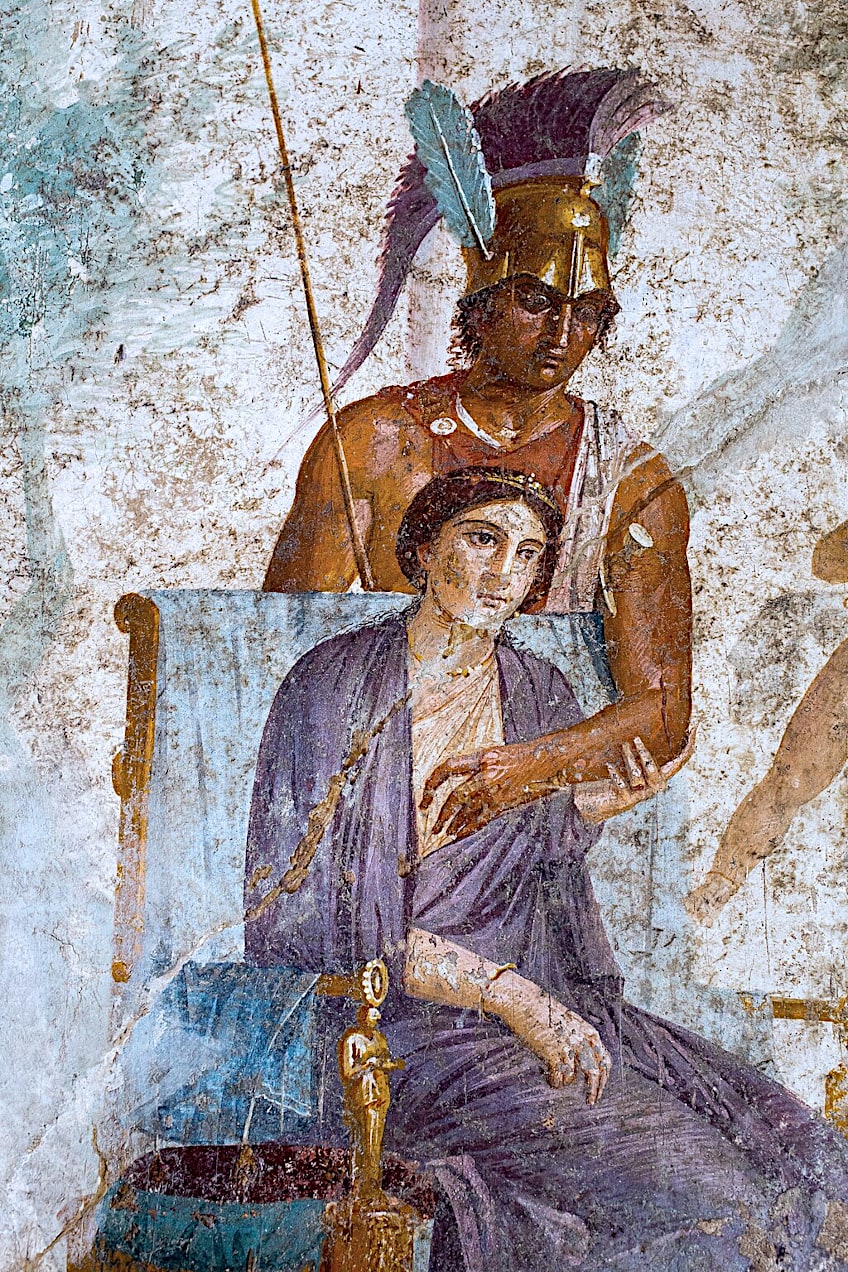 Fresco from Pompeii depicting Ares and Aphrodite (c. 20-10 BCE); ArchaiOptix, CC BY-SA 4.0, via Wikimedia Commons
Fresco from Pompeii depicting Ares and Aphrodite (c. 20-10 BCE); ArchaiOptix, CC BY-SA 4.0, via Wikimedia Commons
Furthermore, she liked watching the gods fall in love with human beings, and she would often get involved in situations that would lead to such occurrences, something Zeus frowned upon. She was notoriously self-centered and indifferent about the consequences of her multiple love affairs, in addition to the entanglements she caused for others. She could appear serious and angry to humans who did not adequately worship her, but compassionate and sympathetic to those who most adored her.
Many Greek authors portray Aphrodite and her power as reprehensible. She is portrayed as an advocate of desire and lust rather than an ambassador of love.
How Aphrodite’s Personality Traits Related to Her Role in Mythology
Aphrodite’s vanity and emphasis on physical appearance reflect her status as a goddess. Aphrodite represented the power of attractiveness and its capacity to evoke love and desire as the personification of physical desire and seduction. Aphrodite’s sensual temperament reflects her function as a sexual goddess. Her impulsive pursuit of pleasure and passion exemplifies the powerful and at times uncontrollable essence of human sexuality, an attribute alluded to by pairing images of Aphrodite with such hyper sexualized creatures as Pan and Satyrs.
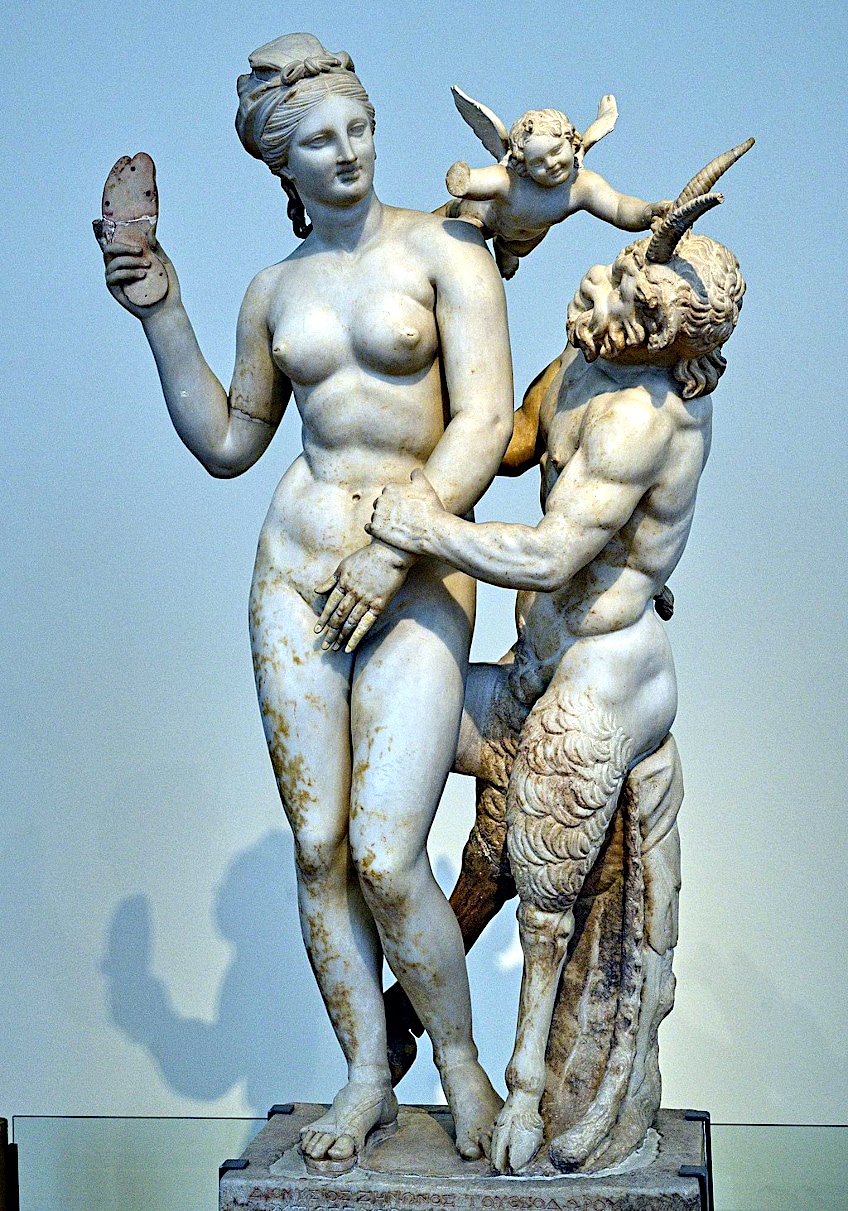 Aphrodite, Pan, and Eros (c. 100 BCE); Zde, CC BY-SA 4.0, via Wikimedia Commons
Aphrodite, Pan, and Eros (c. 100 BCE); Zde, CC BY-SA 4.0, via Wikimedia Commons
Aphrodite’s proclivity to deceive and manipulate others illustrates the complexity of desire and lust. Her acts often resulted in unforeseen consequences, emphasizing the volatile and occasionally devastating nature of human beings and their emotions.
Attributes
One of the goddess of love’s attributes was a chariot. In one story, Aphrodite was traveling in her exquisite chariot, carried by her doves toward Cyprus when she suddenly heard the dying groans of her human lover Adonis and turned her chariot in the direction of his cries.
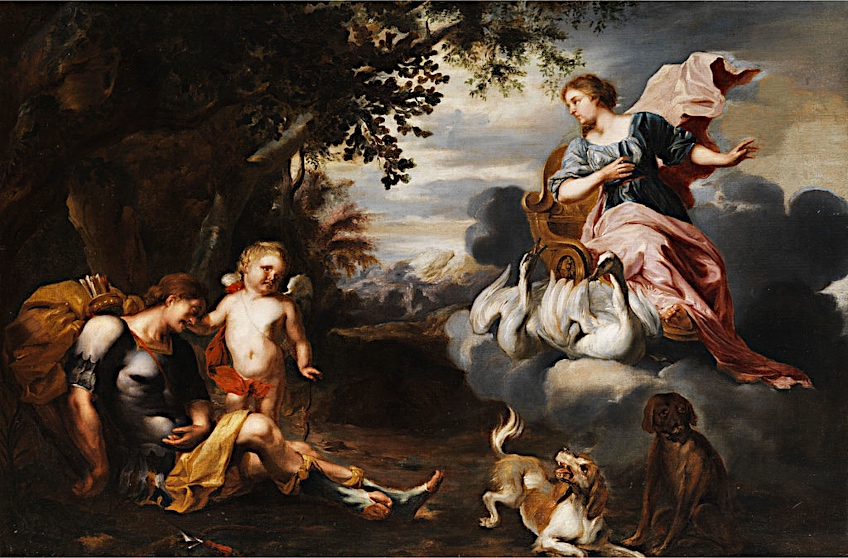 Aphrodite and Adonis by an unknown Flemish painter (17th Century); AnonymousUnknown author (Flemish), Public domain, via Wikimedia Commons
Aphrodite and Adonis by an unknown Flemish painter (17th Century); AnonymousUnknown author (Flemish), Public domain, via Wikimedia Commons
Since in some myths she was born from the waves, Aphrodite was also a goddess of the sea and owned an ocean-going chariot pulled by Tritones with fishtails.
Aphrodite’s enchanted girdle possessed the ability to arouse desire. Hera, as the deity of marriage, took it from Aphrodite on occasion to bring together arguing couples in love and to encourage suitors’ bridal contests.
Physical Appearance and Symbols of Aphrodite
Aphrodite was typically pictured as a beautiful young woman who dressed well and enjoyed wearing jewels. Her eyelashes were elegantly curved, and she had a permanent radiant smile on her gorgeous face. Aphrodite possessed a delicate neck and represented female beauty. She was frequently pictured as having a voluptuous physique and long golden-colored hair, and she was typically depicted naked or wearing a flowing garment that highlighted the curves of her body.
The bird of love, the turtle dove, was a prominent symbol of the Greek goddess Aphrodite. Her heavenly chariot was thought to be drawn by doves, and Astarte (the Syrian incarnation of the goddess) was believed to have been born from an egg tended by doves.
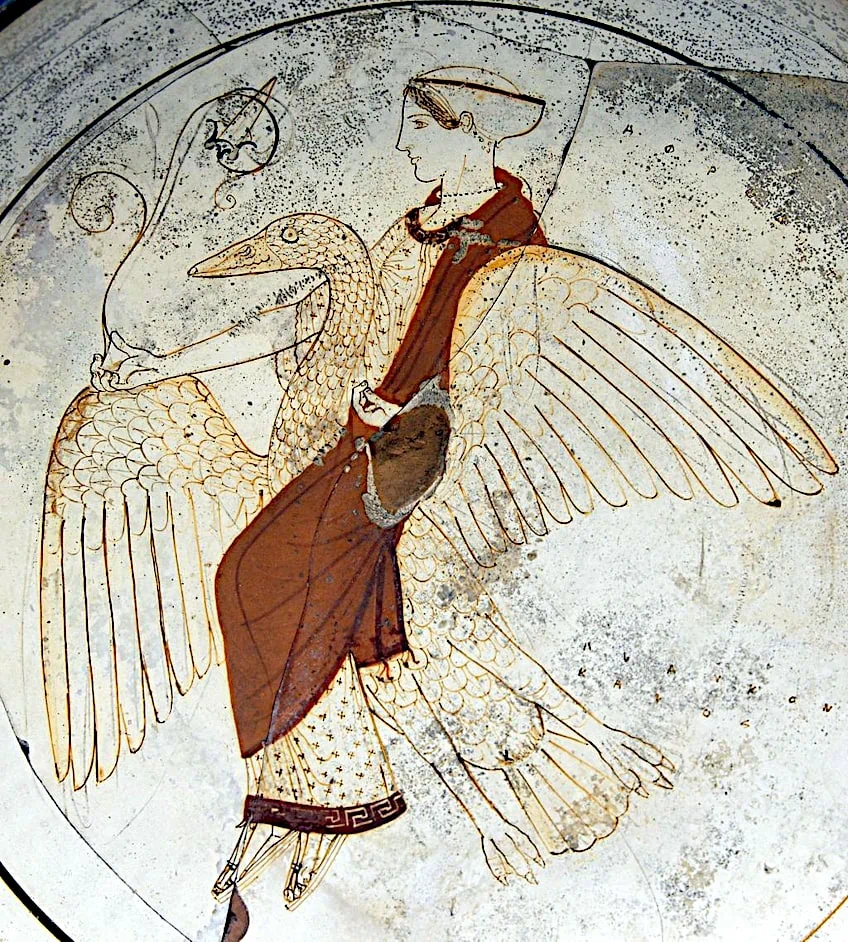 Tondo from an Attic white-ground red-figured kylix featuring a depiction of Aphrodite on a swan (c. 460 BCE); British Museum, CC BY 2.5, via Wikimedia Commons
Tondo from an Attic white-ground red-figured kylix featuring a depiction of Aphrodite on a swan (c. 460 BCE); British Museum, CC BY 2.5, via Wikimedia Commons
Aphrodite also revered the white goose, and she was usually shown riding one side-saddle. Shellfish were also considered sacred to Aphrodite and thus regarded as aphrodisiacs. As a result, the pearl was also Aphrodite’s stone. The cockle shell was another symbol of Aphrodite, who was sometimes represented in her birth scene rising from one. The half-opened shell symbolizes female genitalia. Aphrodite is believed to have introduced the pomegranate to the island of Kypros. The fruit represented female reproductive capacity and the loss of virginity after marriage.
The rose is another Aphrodite symbol. When Aphrodite cut her foot on its thorns while running to the rescue of her dying lover Adonis, she turned them all red.
Aphrodite’s Domains of Influence
Aphrodite was the goddess of love, pleasure, beauty, fertility, and sexuality in Greek mythology. As a result, her spheres of influence encompassed all facets of desire and love. Let’s find out more about her various domains of influence.
Goddess of Love
Aphrodite’s influence in Greek mythology was immense and far-reaching as the goddess of love. She was considered to induce feelings of desire, love, and passion in both mortals and gods, and her power extended to all sorts of love, namely familial love, friendship, and romantic love. Aphrodite appeared frequently in prayers and ceremonies about love and relationships in ancient Greece.
She was said to have the ability to unite couples, deepen existing connections, and heal crushed hearts. Shrines and temples were constructed to worship her as the goddess of love.
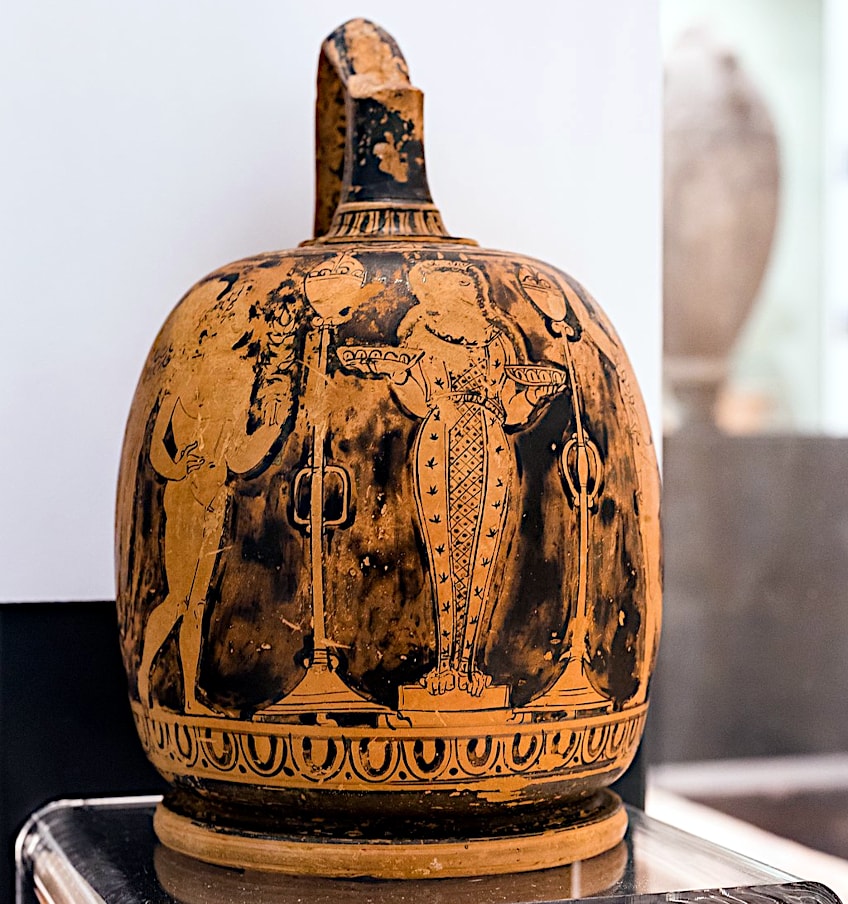 Attic red figure squat lekythos depicting women and Erotes at cult image of Aphrodite (c. 420-400 BCE); ArchaiOptix, CC BY-SA 4.0, via Wikimedia Commons
Attic red figure squat lekythos depicting women and Erotes at cult image of Aphrodite (c. 420-400 BCE); ArchaiOptix, CC BY-SA 4.0, via Wikimedia Commons
The influence of Aphrodite also encompassed sexuality and reproduction. She was connected with physical pleasures and was thought to have the capacity to aid in fertility and pregnancy. As a result of this, she was prayed to by infertile couples and women wanting a pleasant and healthy pregnancy and delivery. Aphrodite’s role in the domain of love had darker elements in Greek mythology too. She was occasionally characterized as a vindictive and jealous deity who punished people who opposed or offended her.
Her influence was also felt in matters of the heart, where her interventions often resulted in despairing consequences, as in the story of Helen of Troy and Paris.
Goddess of Beauty
Aphrodite’s purpose as the goddess of beauty was to represent physical perfection and encourage it in others. She was admired for her beautiful looks, which were thought to be the finest of any Greek goddess.
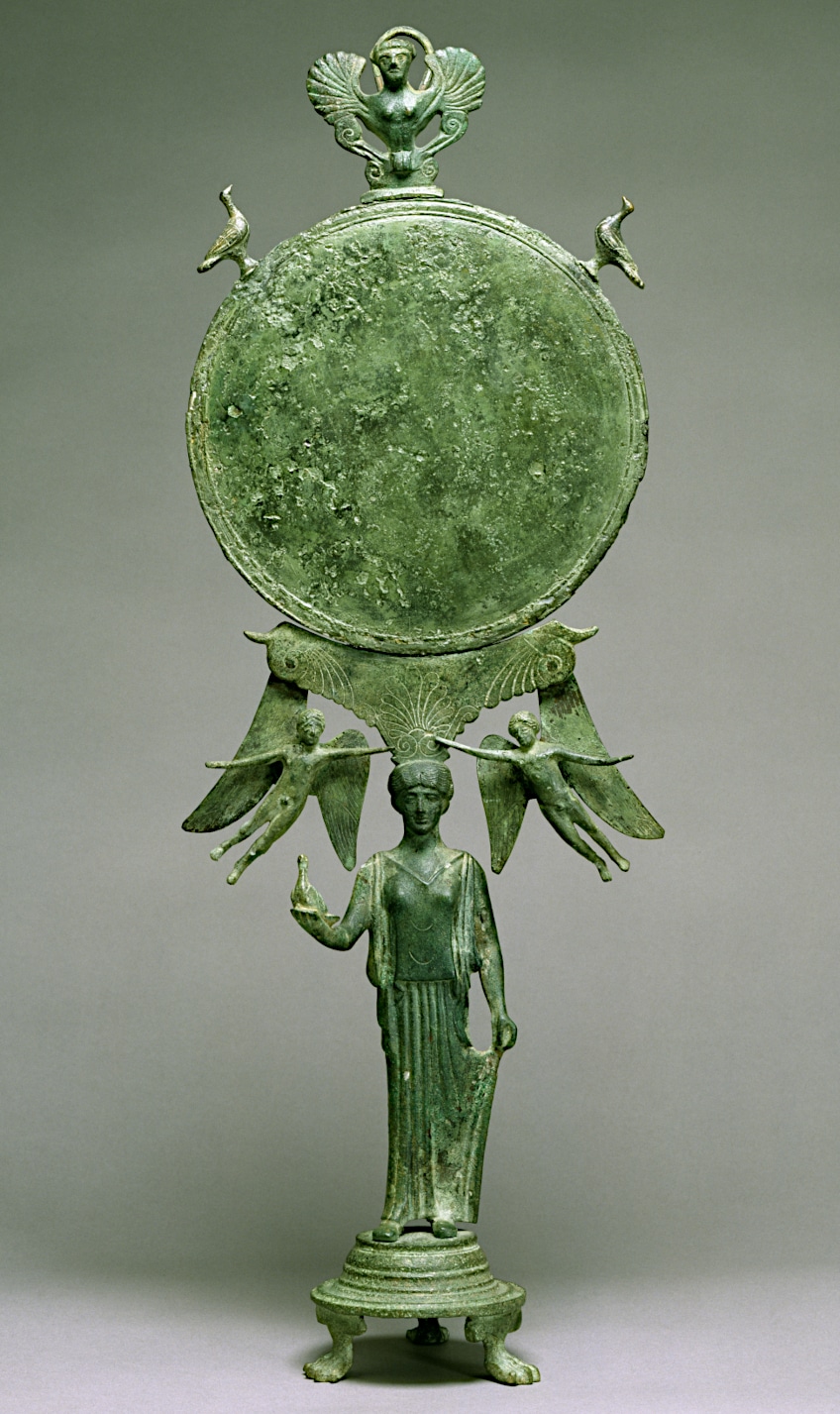 Bronze Caryatid Mirror with Aphrodite (c. 460 BCE); Walters Art Museum, Public domain, via Wikimedia Commons
Bronze Caryatid Mirror with Aphrodite (c. 460 BCE); Walters Art Museum, Public domain, via Wikimedia Commons
Physical beauty was revered in ancient Greek society and was regarded as an indication of moral purity and divine blessing. As a result, Aphrodite’s impact as the goddess of beauty spread beyond the physical sphere to include spiritual beauty.
As the goddess of beauty, Aphrodite’s influence also extended to fashion and jewelry. She often appeared wearing opulent attire and jewels, and her image served to highlight ancient Greek styles and trends.
Goddess of Pleasure
Aphrodite’s influence as the goddess of pleasure extended to all sorts of pleasure, encompassing food, wine, music, and dancing, as well as sexual pleasure. Pleasure was regarded as a fundamental component of existence in ancient Greek civilization, and Aphrodite was venerated as the personification of pleasure. She was therefore connected with festivities, celebrations, and other social activities centered on fulfillment and pleasure.
As the goddess of pleasure, Aphrodite’s work included darker connotations too. She was described occasionally as a seductive and manipulative person who used her powers of seduction to subjugate and mislead others.
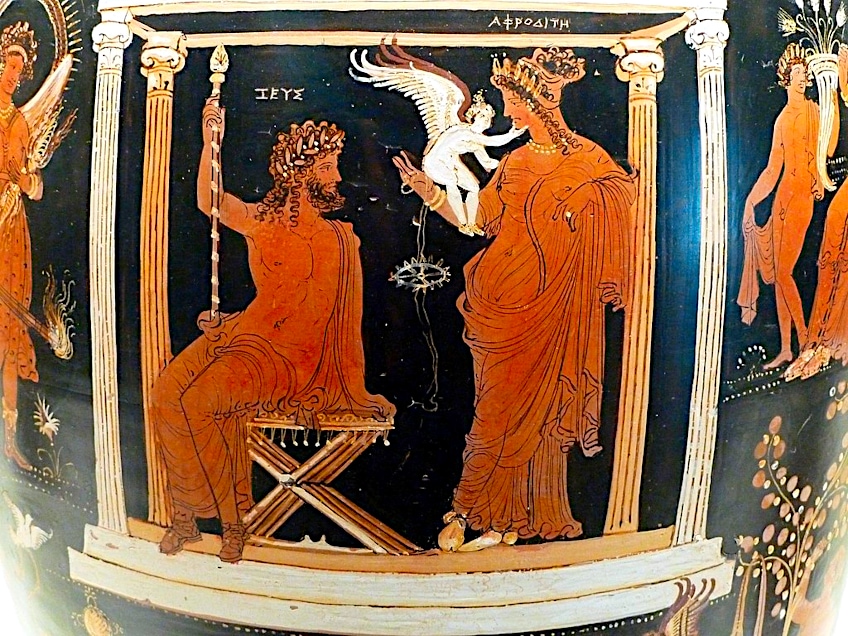 Vase painting of Zeus and Aphrodite planning his seduction of Leda (330 BCE); Dave & Margie Hill / Kleerup from Centennial, CO, USA, CC BY-SA 2.0, via Wikimedia Commons
Vase painting of Zeus and Aphrodite planning his seduction of Leda (330 BCE); Dave & Margie Hill / Kleerup from Centennial, CO, USA, CC BY-SA 2.0, via Wikimedia Commons
In mythology, Aphrodite’s role as the goddess of pleasure frequently resulted in strife and tragedy. Her beauty and allure sparked rivalry and competition among the deities, resulting in conflicts and battles. Her influence in human affairs occasionally resulted in secret affairs, ruined relationships, and other forms of chaos.
Myths Associated With Aphrodite
As she is associated with love, and often the wrath that can accompany it, Aphrodite features in many Greek mythological stories. Aphrodite enjoyed getting involved in mortals’ romantic lives; she found it extremely enjoyable. However, she also had multiple ups and downs in her own love life.
Hephaestus and Ares
As the goddess of love, Aphrodite was renowned for being amorous with many humans and gods. Aphrodite was the goddess of beauty, pleasure, and love. This means she had flirty encounters with a variety of people. Yet, Zeus determined that she should get married and stop her fooling around with men. He compelled Aphrodite to wed with Hephaestus. Hephaestus was the primordial blacksmith who excelled at constructing marvelous things for the divinities, such as the lightning bolt used by Zeus himself, Artemis’ weaponry, and beautiful jewelry pieces, yet he could not win the heart of the goddess with his handiwork.
According to myth, Hephaestus had been left lame after Zeus had thrown him from Olympus after he took his mother Hera’s side during one of her arguments with Zeus over his illegitimate son Heracles.
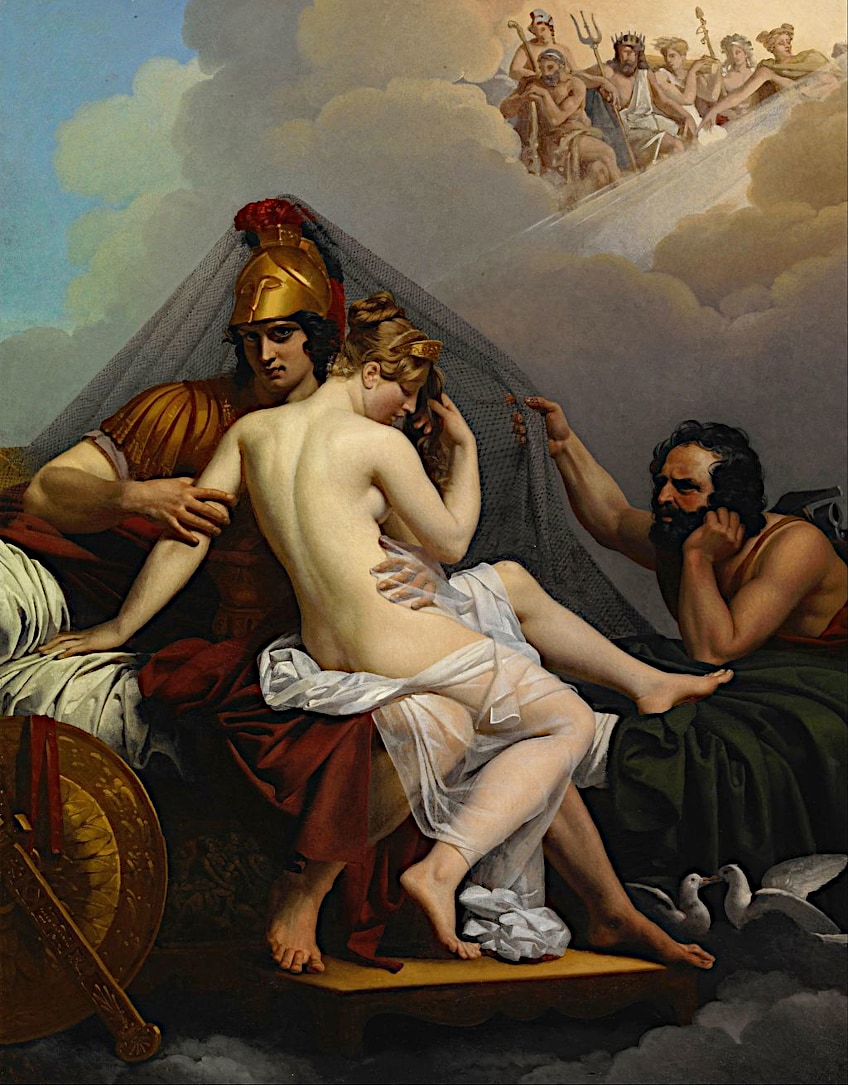 Mars/Ares and Venus/Aphrodite Surprised by Vulcan/Hephaestus by Alexandre-Charles Guillemot (1827); Alexandre-Charles Guillemot, Public domain, via Wikimedia Commons
Mars/Ares and Venus/Aphrodite Surprised by Vulcan/Hephaestus by Alexandre-Charles Guillemot (1827); Alexandre-Charles Guillemot, Public domain, via Wikimedia Commons
Aphrodite was more interested in the savage war god Ares than her intelligent and thoughtful husband. Aphrodite and Ares would often sneak and meet behind Hephaestus’ back, which angered him even more. Hephaestus once crafted a golden net to capture the two lovers in his own bed. He summoned the other deities to witness their betrayal. Although Aphrodite fled in shame, this did not deter her from pursuing her love for Ares, as her interaction with the god of war provided her with an exhilarating experience that satisfied her excitement-seeking spirit.
“All is fair in love and war”, as the saying goes, and both of them were a perfect fit for stirring havoc both in people’s hearts and in war.
Paris and Helen
Paris and Helen are possibly the most renowned examples of the goddess Aphrodite interfering in love affairs. This started when the King of Sparta, Menelaus, vowed to offer up to Aphrodite a magnificent herd of his finest livestock in exchange for helping him in a contest for the prize of Zeus’ magnificent daughter Helen’s hand in marriage. But after successfully winning the contest, the king failed to keep his word, so Aphrodite devised her vengeance – his spouse would leave him for a different man.
When Aphrodite found herself competing for the apple inscribed “for the most beautiful” that was thrown by Eris to cause havoc at the wedding of Peleus and Thetis, she chose the man with whom Helen would elope.
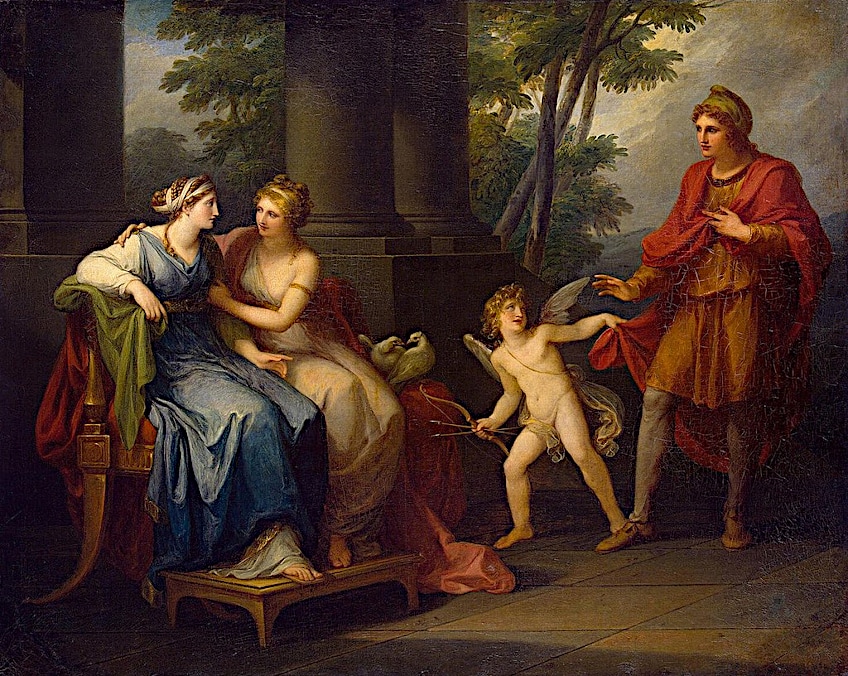 Venus/Aphrodite Induces Helen to Fall in Love with Paris by Angelica Kauffmann (1790); Angelica Kauffmann, Public domain, via Wikimedia Commons
Venus/Aphrodite Induces Helen to Fall in Love with Paris by Angelica Kauffmann (1790); Angelica Kauffmann, Public domain, via Wikimedia Commons
Hera, Athena, and Aphrodite had all claimed the inscribed apple. The gods chose Paris, a young shepherd and son of the king of Troy, to judge who should be awarded the prize. Hera offered him dominion over vast territories, Athena offered him victory in all future battles, while Aphrodite promised him the most desirable woman in the world. Since this was Helen and she was already married, Aphrodite instructed her son Eros to send divine arrows of love into Helen’s heart, causing her to escape with Paris once he arrived in Sparta.
When the two lovers fled to the young man’s hometown of Troy, Menelaus’ very powerful brother Agamemnon, king of Mycenae summoned every Greek state to besiege Troy. For slightly over a decade, the Greeks and Trojans fought, and many souls were delivered to Hades.
Hippomenes
Aphrodite seems to have loved assisting young princes in winning the hearts of ladies. Another Greek story depicts the goddess assisting the Greek prince, Hippomenes in winning the huntress Atalanta’s horrific marriage contest. Atalanta did not want to get married; instead, as an acolyte of Artemis, she enjoyed roaming the wilderness and hunting. To keep her father happy, she agreed to get married to whoever was able to defeat her in a footrace.
Those who did not succeed would be killed. Hippomenes begged the goddess of love for her assistance, and she felt sorry for him.
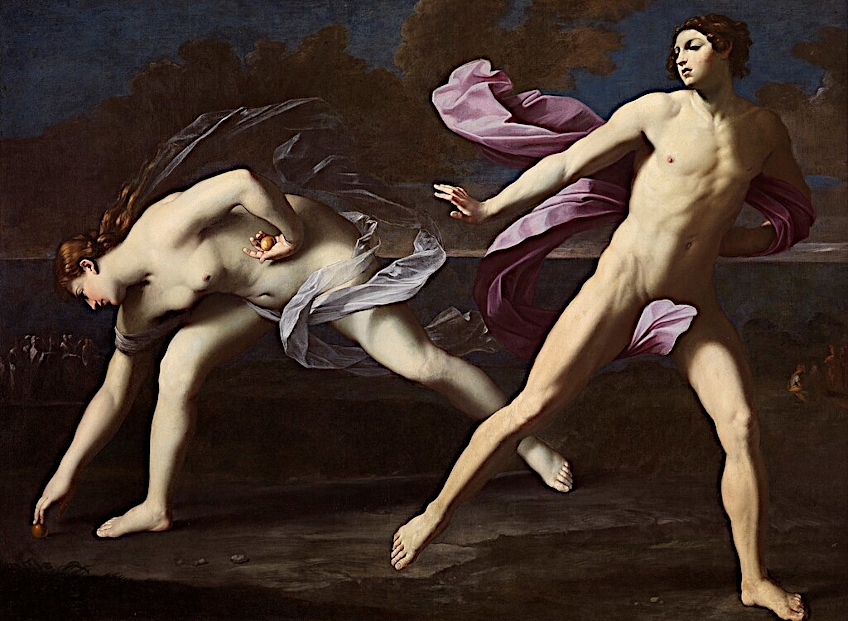 Atalanta and Hippomenes by Guido Reni (c. 1620-25); Guido Reni, Public domain, via Wikimedia Commons
Atalanta and Hippomenes by Guido Reni (c. 1620-25); Guido Reni, Public domain, via Wikimedia Commons
She supplied Hippomenes with three enticing golden apples and instructed him to put them into Atalanta’s route during the race. As a huntress, Atalanta liked to let her suitors gain the lead so that she could catch up to them from behind and then kill them. The apples however, were so lovely that Atalanta felt impelled to pick them up, allowing Hippomenes to stay ahead of her. The strategy worked, as Hippomenes eventually won the race and the hand of Atalanta.
However, the story does not end there. Hippomenes neglected to thank the goddess, so she forced them to have sexual encounters in a temple of either Zeus of Cybele. In punishment for this outrageous act of sacrilege the lovers were transformed into a pair of lions. Since the ancient Greeks believed that lions did not mate with other lions, but with leopards instead, Aphrodite’s punishment meant that they could never be lovers again.
Eros and Psyche
Eros, the god of sensual love, was the son of the goddess Aphrodite. He is frequently represented as having wings and a bow and arrow and is often known by his other name, Cupid. He was portrayed as an adolescent in Greek mythology but as a newborn in Roman mythology. He would shoot his magical arrows into people’s hearts, causing them to find themselves in love, regularly on the orders of Aphrodite. When word spread that an exquisite earthly woman named Psyche could rival Aphrodite’s own beauty, she felt envious. She told her son to use his magical arrows to make Psyche fall in love with a horrible beast.
However, Eros himself ended up falling in love with Psyche after seeing her. Eros tried to keep his identity a secret from Psyche. He only visited her at night and instructed her to never look at him.
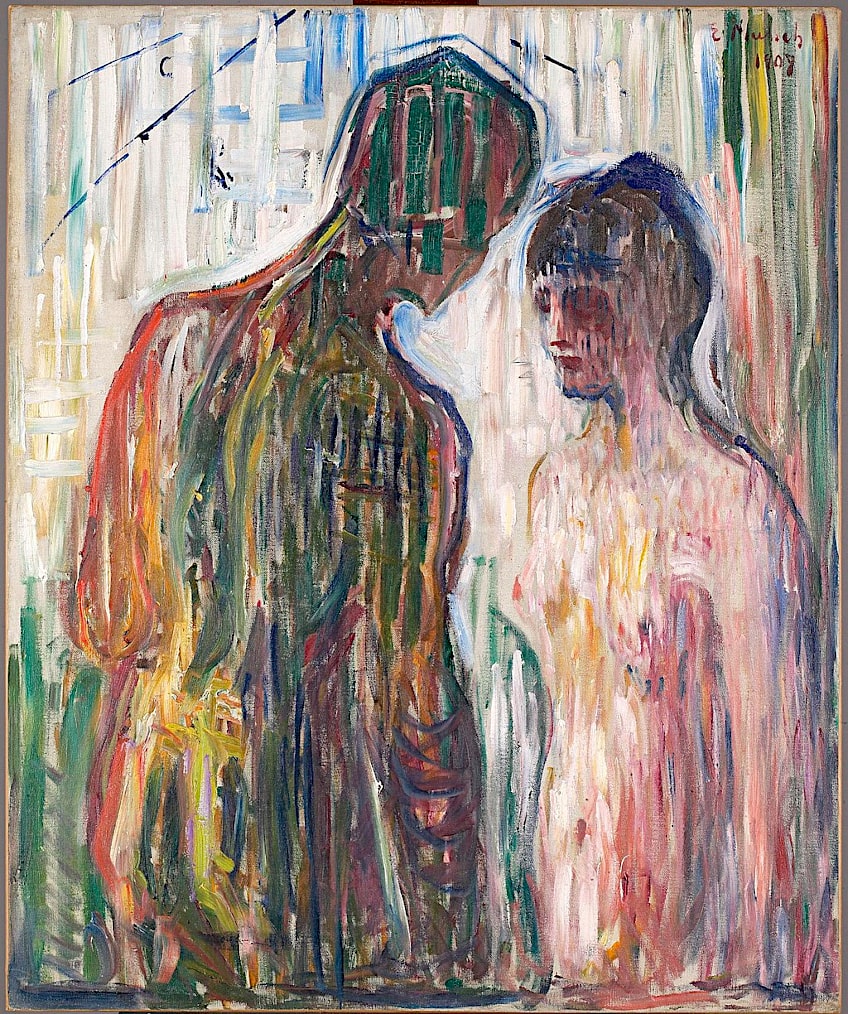 Cupid/Eros and Psyche by Edvard Munch (1907); Edvard Munch, Public domain, via Wikimedia Commons
Cupid/Eros and Psyche by Edvard Munch (1907); Edvard Munch, Public domain, via Wikimedia Commons
Consumed by curiosity, egged on by her sisters, and under the impression that she had married a monstrous beast, Psyche waited until she knew Eros was asleep, then lit a lamp to look at her husband. He was awakened by hot candle wax dripping on him. Enraged at this betrayal, Eros abandoned Psyche. Psyche then implored Aphrodite forced Psyche to do a series of difficult and more deadly tasks, including traveling to the underworld to fetch an amphora of the water of youth.
Again, she gave in to her curiosity and opened the vase, falling into a deep sleep. Eros and Aphrodite finally took pity on her and they were all reconciled.
Continuing Legacy in the Modern Era
Aphrodite’s modern-day legacy can be observed in many different facets of popular art, culture, and literature. Many contemporary authors and movie producers have used her mythology to produce captivating storylines, characters, and ideas. For instance, Rick Riordan’s popular novel series Percy Jackson and the Olympians features Aphrodite as one of the characters.
From Botticelli’s famous painting, The Birth of Venus (1486), to modern-day fashion photography, her identification with sensuality and beauty has impacted the development of a number of iconic pictures.
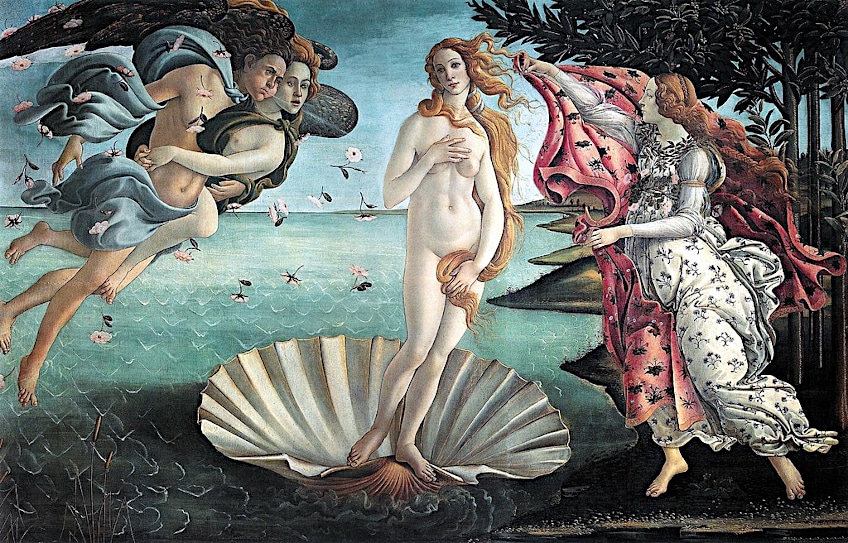 The Birth of Venus by Sandro Botticelli (c.1485); Sandro Botticelli, Public domain, via Wikimedia Commons
The Birth of Venus by Sandro Botticelli (c.1485); Sandro Botticelli, Public domain, via Wikimedia Commons
Aphrodite’s impact can also be observed in the continuous celebration of romance and love in our current society, in addition to her various cultural influences. Many modern-day wedding and relationship rituals originated in ancient Greek traditions that revered Aphrodite and her ability for igniting love.
That completes our look at the facts about Aphrodite. While she was known as being the most physically attractive of the Olympians, she was also very vain and jealous. This resulted in many stories where she would interfere in the love lives of other people, as well as stories where her wrath was dished out to those who took her for granted or wronged her in any way. In this manner, she also represented human love, which can often be selfless and giving, yet at other times, selfish and vindictive.
Frequently Asked Questions
What Is Aphrodite the Goddess Of?
First and foremost, the Greek goddess Aphrodite is known as the goddess of love. She is also, though, the goddess of many other domains associated with love. This includes the domains of beauty and pleasure. This is because physical attraction plays a large role in falling in love, and love can be a very pleasurable experience.
What Does Aphrodite Want to Control?
The goddess of love is always getting involved in the love lives of other people, constantly wanting to control the direction of the relationship and determine who ends up with who. In several stories, she has meddled in the affairs of both gods and mortals. She often used her son, Eros (Cupid) to fulfill her wishes, and she would send him out to manipulate the hearts of people by shooting them with his divine arrows of love. While she would grant favors to those looking for love, she could be extremely vindictive if she was not thanked for her efforts.

I am deeply passionate about history and am constantly fascinated by the rich and complex stories of the past. As the editor-in-chief of learning-history.com, I have the opportunity to share this passion with a wide audience through the creation and distribution of engaging and informative content about historical events, persons, and cultures. Whether it’s through writing articles and blog posts or creating videos or podcasts, I strive to bring the past to life in a way that is both accurate and enjoyable. My expertise in history, combined with my strong writing and communication skills, allows me to effectively communicate complex historical concepts and make them accessible and interesting to a wide range of readers. I am truly grateful for the opportunity to share my love of history with others through my work on learning-history.com.

